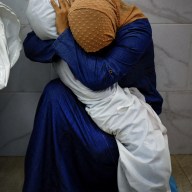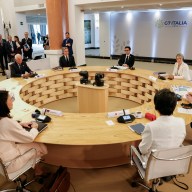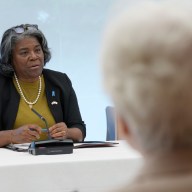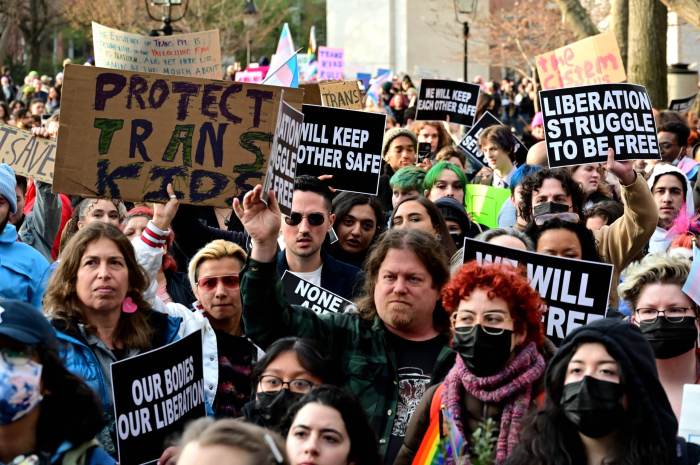While talking to Zoe Kravitz about her drone pilot drama “Good Kill,” her phone buzzes. “It’s just my dad wanting to facetime,” she remarks, casually. Her dad, of course, is not just a dad. He’s Lenny Kravitz, and her mother is Lisa Bonet — a musician and an actress, respectively. Zoe, naturally, does both. (And so do her parents: Lisa played in a band in “High Fidelity” and Lenny has acted in “Precious” and two “The Hunger Games” movies.) In between releasing music with her band Lolawolf, Zoe has extended the mish-mash approach to films, juggling franchise entries (“X-Men: First Class,” “Divergent,” “Mad Max: Fury Road”) with smaller titles. In the most recent, “Good Kill,” she and Ethan Hawke play drone pilots who do missions and bomb suspects far, far removed from the action: in Las Vegas. You’ve said you don’t like to talk politics. What drew you to this subject? I’m very honest about it. I’m not claiming to be a politician; I’m not claiming to have the answers. Basically, I did this movie to open my eyes to how ignorant I am on the drone program. I had never taken the time to research it or knew much about it. That means there are other people who don’t know about it, and that doesn’t make them stupid either. I wanted to help get that information out there. What angle on drones most intrigued you?
The thing that disturbs me the most is the disconnect. We are developing these programs in which we’re able to play god with zero consequences for ourselves. That gets really scary.
As Hawke’s character says, he can go kill people and then have a barbecue.
There’s something to be said about choosing to go to war for your country and having to leave your family. You go and you get dirty and you get bloody and you sacrifice yourself. People really think about what they’re doing in those situations. There’s a human contact. You have to look into the person’s eyes you’ve just killed and understand what it means. And when that’s taken away, it’s scary, because the human aspect of war — and war is human instinct, I believe — is gone. This is a delicate subject, as you don’t want to alienate the people you’re portraying, even as you criticizing their job.
Andrew did a great job of not picking one side or the other. Obviously if you’re a compassionate human being there’s a way you might choose to go. I hadn’t thought about how it affects the people flying the drones. It opened my eyes. I think we tried to honor that. What drew you to your character on top of the subject?
She plays the moral compass of the story. She’s the one who asks all the questions the audience is asking, hopefully. I felt like she’s very young to be in that position. And the journey she goes on is what all young people have to go through, which is asking , what kind of person do I want to be? Do I want to be told what to do or do what I say I believe in? Or do I want to be a robot and push buttons because someone told me to? Whatever your line of work you have to ask yourself those questions. “Good Kill,” in one respect, is reminiscent of films like “Three Kings” and “Jarhead,” where soldiers sign up and are surprised, even disappointed, by how dull it is.
All of what she thought would be the exciting parts wound up being heartbreaking. It’s not action; it’s murder. Once that sets in the idea of what her job description changes a bit.
You seem to be finally, at 26, breaking out of high school roles.
Thank god.
That doesn’t always happen, even if you’re 30.
I look very young. I get carded and I’ll show a passport and people are still like, “Come on.” It’s a passport — what, do you think I’m Jason Bourne? I think I’m finally starting to look my own age, which is great because I am very tired of playing high school students. You’ve been working on your own projects, which must help you get the right parts.
Roles that are written for women that are funny, young, half-black [laughs] — people don’t always have those specific niches in mind.
Do you think its getting better?
It’s a little bit better. It’s still a slow process. This is the most racist industry in the world. It’s crazy what they’re able to do and how short-sighted people can be. It is changing more and more. I’m just trying to help it along. You’ve jumped back and forth between movies and music. The idea of working in different art forms simultaneously still seems like a new idea.
Maybe 10 years ago it was rare, but 50 years ago you had to be a triple threat to make it in this industry. You look at Gene Kelly or Judy Garland — you had to be able to sing, dance and act. You had to do all three. It’s funny that people have been boxed now into doing just one. A performer is a performer. It’s a spirit you have. I have a performer’s spirit. I like to do all things performance. I like to dance, I like to sing, I like to act. I like to do it all. I think it makes so much more sense to do more than one. So you don’t worry much when hopping between music and movies.
My brain doesn’t separate the two. I like making art.
Follow Matt Prigge on Twitter @mattprigge


















